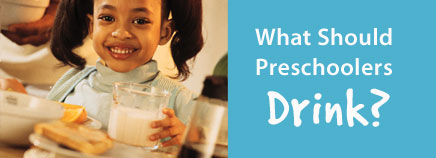
The best drinks for preschoolers — and for kids of all ages — are milk and water. Whenever possible, discourage your kids from drinking soda and other sugary, calorie-dense drinks as thirst-quenchers because water or milk will do the job just as well.
Preschoolers should have 2 to 2½ cups (480-360 milliliters) of low-fat or nonfat milk (or equivalent dairy products) every day.
Now is the time to get kids into the habit of drinking milk so they can get bone-building calcium and vitamin D and other important nutrients they need. Limit flavored milks, but if you do serve it, avoid premixed chocolate or strawberry drinks, which often contain considerably more calories, sugar, and fat than milk you flavor yourself. For kids who don’t drink milk, calcium-fortified soy milk is a good alternative.
Avoid juice drinks and limit 100% juice — which has a significant amount of sugar — to no more than one serving, about 4-6 ounces (120-180 milliliters) a day. Too much juice can contribute to excess weight gain, diarrhea, and tooth decay.
| DRINK | SIZE | CALORIES | SUGAR |
| Water | 8 ounces (240 ml) | 0 | 0 g |
| Low-fat milk | 8 ounces (240 ml) | 100 | 11 g |
| 100% orange juice | 8 ounces (240 ml) | 110 | 22 g |
| Juice drink (10% fruit juice) | 8 ounces (240 ml) | 150 | 38 g |
| Powdered drink mix (with sugar added) | 8 ounces (240 ml) | 90 | 24 g |
| Soda | 8 ounces (240 ml) | 100 | 27 g |
Soda Gets in the Way
Many kids like cola and other soft drinks, but these have no nutritional value and are high in sugar. One study found that more than 1 out of 3 preschoolers drank soda on the day before the survey. On average, the kids drank over 8 ounces of soda or sugar-sweetened fruit drink, but only drank 12 ounces of milk, which is less than the recommended 16-20 ounces a day.
Kids may be less likely to drink enough milk if soda and other sugar-sweetened beverages are available. Besides calcium, milk offers other important nutrients, including vitamin D, potassium, and protein.
Drinking soda and other sugary beverages has been linked to excessive weight gain and other problems, including tooth decay. And kids tend to drink increasing amounts as they get older.
Caffeine and Kids: a Bad Mix
In addition to calories and sugar, soda often contains caffeine, which can have negative effects on kids. Most parents wouldn’t dream of giving a preschooler a cup of coffee, but might routinely serve cola and other drinks containing caffeine. For kids, the effects of caffeine are similar to those seen in adults.
 Too much caffeine can cause:
Too much caffeine can cause:
- jitteriness and nervousness
- upset stomach
- headaches
- difficulty concentrating
- difficulty sleeping
To avoid giving kids too much caffeine, read nutrition labels on food and drinks. And don’t forget about the caffeine found in chocolate, coffee ice cream, and iced tea drinks.
Although the United States has not adopted guidelines for caffeine consumption in kids, Canadian guidelines recommend that preschoolers have no more than 45 milligrams of caffeine a day. This is the average amount in a 12-ounce (360-milliliter) can of cola or a 6-ounce (45-gram) milk chocolate bar.
Water is a caffeine-free, zero-calorie thirst quencher and milk has nutrients to help kids grow up strong. Limit the empty calorie drinks you serve, and teach your kids that water and milk are the best drinks for them.

